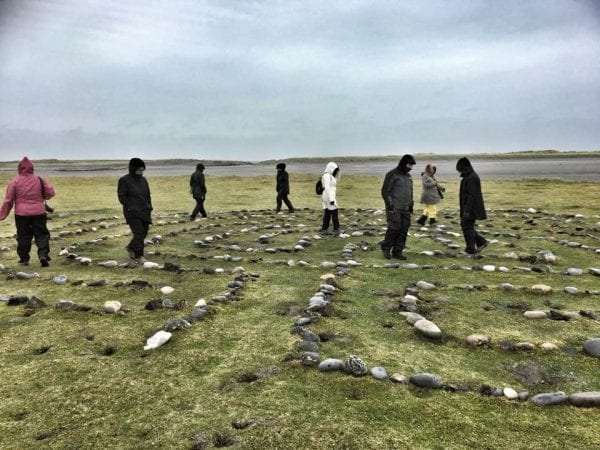 Dearest monks, artists, and pilgrims,
Dearest monks, artists, and pilgrims,
During this Jubilee year of sabbatical we are revisiting our Monk Manifesto by moving slowly through the Monk in the World retreat materials together every Sunday. Each week will offer new reflections on the theme and every six weeks will introduce a new principle.
Principle Three: I commit to cultivating community by finding kindred spirits along the path, soul friends with whom I can share my deepest longings, and mentors who can offer guidance and wisdom for the journey.
Nehemiah 1:1-11
Nehemiah Prays for His People
The words of Nehemiah son of Hacaliah. In the month of Chislev, in the twentieth year, while I was in Susa the capital, one of my brothers, Hanani, came with certain men from Judah; and I asked them about the Jews that survived, those who had escaped the captivity, and about Jerusalem. They replied, ‘The survivors there in the province who escaped captivity are in great trouble and shame; the wall of Jerusalem is broken down, and its gates have been destroyed by fire.’
When I heard these words I sat down and wept, and mourned for days, fasting and praying before the God of heaven. I said, ‘O LORD God of heaven, the great and awesome God who keeps covenant and steadfast love with those who love him and keep his commandments; let your ear be attentive and your eyes open to hear the prayer of your servant that I now pray before you day and night for your servants the people of Israel, confessing the sins of the people of Israel, which we have sinned against you. Both I and my family have sinned. We have offended you deeply, failing to keep the commandments, the statutes, and the ordinances that you commanded your servant Moses. Remember the word that you commanded your servant Moses, “If you are unfaithful, I will scatter you among the peoples; but if you return to me and keep my commandments and do them, though your outcasts are under the farthest skies, I will gather them from there and bring them to the place at which I have chosen to establish my name.” They are your servants and your people, whom you redeemed by your great power and your strong hand. O Lord, let your ear be attentive to the prayer of your servant, and to the prayer of your servants who delight in revering your name. Give success to your servant today, and grant him mercy in the sight of this man!’
At the time, I was cupbearer to the king.
Background
The Book of Nehemiah is unique among the Hebrew Scriptures because its author never intended it to be a religious text. Nehemiah is not a prophet or priest. He’s a bureaucrat. When we first meet him, Nehemiah is a public servant to a gentile king. But Nehemiah learns of the plight of Jerusalem after the Babylonian invasion and brings his concerns to the king. The king is moved by Nehemiah’s passion and so not only gives Nehemiah leave to return to the Jerusalem, but gives him the authority and resources to rebuild the city.
What eventually is edited into the Biblical text we now know as ‘The Book of Nehemiah’ is originally his personal journal and progress reports back to the king. There is a beautiful honesty in the lack of a dogmatic agenda. He’s not trying to make a great theological statement; he’s just telling what happens.
And what happens is simple. Nehemiah returns to Jerusalem and discovers, first hand, that the reports of the city’s demise are true. The walls have massive gaps and falling apart, leaving it under constant threat of attack. The people living there are largely impoverished and those who are doing moderately well are too afraid of losing what little they have to help their neighbors.
Under Nehemiah’s leadership, all that changes. It helps that the king sent him with men and supplies, but Nehemiah organizes work details. Everyone, according to their abilities, is given a task. The work of rebuilding, restoring the city is a collective effort. Everyone has a sense of pride and ownership, because they all chipped in to accomplish a common goal that benefited all of the entire community.
Reflection
The work that Christine and I do at Abbey of the Arts is not just about the two of us. It is in service of a community. And that work is accomplished by a community.
We have people who help us in the administration of the website and communications. We have guest teachers contributing content to online courses. And on our in-person pilgrimages, we have numerous local guides and businesses (from transportation, accommodation, and food to local experts taking our groups physically and mentally through the different places we visit).
When we first had the idea to lead a pilgrimage in the west of Ireland, we booked a nearby B&B and hired a couple of local guides to help familiarize ourselves with the locations we already knew we wanted to take our groups. Our choice of accommodations had more to do with proximity than first-hand experience staying there. And we were only hoping to “pick the brains” of a few local guides to help us fill in some information gaps for when we took our groups out on our own.
But after meeting with the B&B owners and sitting down to breakfast after a tour of their facilities, we knew this sweet couple understood hospitality on a truly profound level. And when the personal guides we hired started reciting poetry, between gushing about how delighted they were to talk more about the rich spiritual histories of the places they regularly took groups to . . . we knew we had to include these individuals are part of our pilgrimages. They were part of the local landscape as much as any rock or well.
Not only can I now not imagine doing our Galway pilgrimages without these people, I wouldn’t want to. And I doubt we’d get as many returning pilgrims without them. We are all part of the same sacred journey, the same spiritual community.
With great and growing love,
John
John Valters Paintner, MTS
Photo © Christine Valters Paintner


